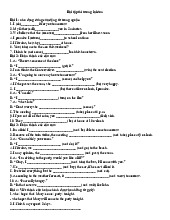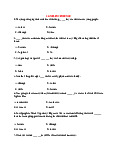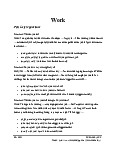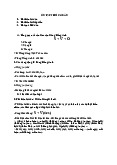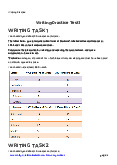








Preview text:
READING 5
UNIT 2: LIES AND TRUTH - EXTRA PRACTICE READING 1 1
However much we may abhor it, deception comes naturally to all living things.
Birds do it by feigning injury to lead hungry predators away from nesting young. Spider
crabs do it by disguise: adorning themselves with strips of kelp and other debris, they
pretend to be something they are not
– and so escape their enemies. Nature amply
rewards successful deceivers by allowing them to survive long enough to mate and
reproduce. So it may come as no surprise to learn that human beings- who, according
to psychologist Gerald Johnson of the University of South California, or lied to about
200 times a day, roughly one untruth every 5 minutes- often deceive for exactly the
same reasons: to save their own skins or to get something they can’t get by other means. 2
But knowing how to catch deceit can be just as important a survival skill as
knowing how to tell a lie and get away with it. A person able to spot falsehood quickly
is unlikely to be swindled by an unscrupulous business associate or hoodwinked by a
devious spouse. Luckily, nature provides more than enough clues to trap dissemblers in
their own tangled webs- if you know where to look. By closely observing facial
expressions, body language and tone of voice, practically anyone can recognise the tell-
tale signs of lying. Researchers are even programming computers – like those used on
Lie Detector -to get at the truth by analysing the same physical cues available to the
naked eye and ear. “With the proper training, many people can learn to reliably detect
lies,” says Paul Ekman, professor of psychology at the University of California, San
Francisco, who has spent the past 15 years studying the secret art of deception. 3
In order to know what kind of Lies work best, successful liars need to accurately
assess other people’s emotional states. Ackman’s research shows that this same
emotional intelligence is essential for good lie detectors, too. The emotional state to
watch out for is stress, the conflict most liars feel between the truth and what they actually say and do. 4
Even high-tech lie detectors don’t detect lies as such; they merely detect the
physical cues of emotions, which may or may not correspond to what the person being
tested is saying. Polygraphs, for instance, measure respiration, heart rate and skin
conductivity, which tend to increase when people are nervous – as they usually are when
lying. Nervous people typically perspire, and the salts contained in perspiration
conducts electricity. That’s why sudden leap in skin conductivity indicates nervousness
-about getting caught, perhaps -which makes, in turn, suggest that someone is being
economical with the truth. On the other hand, it might also mean that the lights in the
television Studio are too hot- which is one reason polygraph tests are inadmissible in
court. “Good lie detectors don’t rely on a single thing” says Ekma, but interpret clusters
of verbal and non-verbal clues that suggest someone might be lying.” 5
The clues are written all over the face. Because the musculature of the face is
directly connected to the areas of the brain that processes emotion, the countenance can
be a window to the soul. Neurological studies even suggest that genuine emotions travel
different pathways through the brain than insincere ones. If a patient paralyzed by stroke
on one side of the face, for example, is asked to smile deliberately, only the mobile side
of the mouth is raised. But tell that same person a funny joke, and the patient breaks
into a full and spontaneous smile. Very few people -most notably, actors and politicians-
are able to consciously control all of their facial expressions. Lies can often be caught
when the liars true feelings briefly leak through the mask of deception. We don’t think
before we feel, Ekman says. “Expressions tend to show up on the face before we’re
even conscious of experiencing an emotion.” 6
One of the most difficult facial expressions to fake- or conceal, if it’s genuinely
felt - is sadness. When someone is truly sad, the forehead wrinkles with grief and the
inner corners of the eyebrows are pulled up. Fewer than 15% of the people Ekman tested
were able to produce this eyebrow movement voluntarily. By contrast, the lowering of
the eyebrows associated with an angry scowl can be replicated at will but almost
everybody. “If someone claims they are sad and the inner corners of their eyebrows
don’t go up, Ekmam says, the sadness is probably false.” 7
The smile, on the other hand, is one of the easiest facial expressions to
counterfeit. It takes just two muscles -the zygomaticus major muscles that extend from
the cheekbones to the corners of the lips- to produce a grin. But there’s a catch. A
genuine smile affects not only the corners of the lips but also the orbicularis oculi, the
muscle around the eye that produces the distinctive “crow’s feet” associated with people
who laugh a lot. A counterfeit grin can be unmasked if the corners of the lips go up, the
eyes crinkle, but the inner corners of the eyebrows are not lowered, a movement
controlled by the orbicularis oculi that is difficult to fake. The absence of lowered
eyebrows is one reason why the smile looks so strained and stiff.
Question 1. What does the author want to emphasize in paragraph 1?
A. All living animals can lie.
B. Lying is the most important survival skill of human being.
C. Telling lies is a surprising skill of human. D. All people hate deception.
Question 2. According to the article, which of the following is NOT a clue that
nature supplies for human to spot a liar? A. facial expression B. tone of voice C. body language D. respiration
Question 3. How does the lie detector work?
A. It detects whether one's emotional state is stable.
B. It detects one’s brain activity level.
C. It detects body behaviour during one's verbal response.
D. It analyses one's verbal response word by word.
Question 4. Lie detectors can't be used as evidence in a court of law because
A. Lights often cause lie detectors to malfunction.
B. They are based on too many verbal and non-verbal clues.
C. Polygraph tests are often inaccurate.
D. There may be many causes of certain body behavior.
Question 5. Why does the author mention the paralyzed patients?
A. To demonstrate how a paralyzed patient smiles
B. To show the relation between true emotions and body behavior
C. To examine how they were paralyzed
D. To show the importance of happiness from recovery
Question 6. The author uses politicians to exemplify that they can A. Have emotions. B. Imitate actors.
C. Detect other people's lives. D. Mask their true feelings.
Question 7. Which of the following traits refers to sadness?
A. inner corners of eyebrows are raised B. the whole eyebrows lowered C. lines formed around D. none of the above
Question 8. Which of the following traits refers to anger?
A. inner corners of eyebrows are raised B. the whole eyebrows lowered C. lines formed around
D. lines form above the eyebrows
Question 9. Which of the following traits refers to happiness?
A. inner corners of eyebrows are raised B. the whole eyebrows lowered C. lines formed around
D. lines form above the eyebrows
Question 10. What is the main idea of the reading?
A. Some people tell lies for self-preservation.
B. Human being is the best liar.
C. To be a good liar, one has to understand other people's emotions. D. How to spot a liar READING 2
FACEBOOK AND POLITICAL ADS
The 2020 presidential election is coming up and Facebook is under pressure. Many
groups have been pushing Facebook to change its rules about political advertisements.
Candidates use political advertising to share their views and to persuade voters.
However, on January 9, 2020, Facebook announced it will not change its rules.
Facebook will not ban political ads or even make sure the ads are true. It also will not
limit how the ads are targeted to specific groups of people.
Instead, Facebook users will have more control over how many political ads they see.
It will also be easier to search Facebook's online library of political ads.
Many people disagree with Facebook's decision. They believe Facebook has too much
power and that social media is altering elections.
Misinformation Is A Big Problem
Other social media companies such as Google and Twitter have made different
decisions about political advertising. For example, Twitter is banning all political ads.
Bill Russo works for former Vice President Joe Biden, who is running for president.
He says that Facebook is just allowing people to pay to spread false information. This is known as misinformation.
Social media companies have been trying to figure out what to do with
misinformation since the 2016 U.S. presidential election. Before that election, a huge
amount of money was paid by Russia for thousands of fake political ads on social media.
Misinformation has been a problem in the United States. President Donald Trump's
campaign recently released a video ad about candidate and former Vice President
Biden that some people are calling misleading. Facebook, Twitter and Google refused to remove the video.
Facebook insists it will not fact-check political ads. Fact-checking is when someone
investigates something to make sure what it is claiming is true. Facebook CEO Mark
Zuckerberg has said that "political speech is important" and that Facebook does not
want to interfere with important political speech. But critics say Zuckerberg is just allowing politicians to lie.
Television stations and networks are not required to fact-check ads either. The
difference is that on social media, candidates have the advantage of "microtargeting" their ads.
They Know What You Look At Online
Microtargeting is when an ad is shown only to certain people. Politicians can show
people ads based on their interests. They can see what issues people care about by
looking at what they do on Facebook. This tells them which issues are important to users.
For example, some users might care about climate change. Microtargeting means that
they would be shown ads about climate change because that issue is important to
them. Other users would not see these ads or they might see completely different ads.
In November 2019, Google began to limit political ad targeting. Now, candidates can
only target ads to people based on their sex, age and location. They cannot show ads
to certain people based on their political beliefs.
Jason Kint runs a media company. He supports Google's ban on microtargeting. Kint
says ads need to reach larger groups of people. That way, the public can debate the ads
and correct any false information.
Facebook said it considered limiting microtargeting. However, political groups and
other organizations convinced Facebook not to ban microtargeting. The groups told
Facebook that microtargeting was important for helping them reach important voters.
Facebook said it believes people should be able to hear from the candidates. Then,
what the candidates say in their ads should be debated in public.
Facebook will allow users to choose to see fewer political ads. However, it will not let
people stop seeing them entirely.
Who Should Make The Ad Rules?
The company is also making changes to its ad library. People will be able to search for
ads based on when they were shown and what parts of the country saw them.
Facebook already allows people to see the age, gender and location of the people who saw certain ads.
Facebook said that the government should be more responsible for making rules about
political ads. Private companies should not be making the rules. Experts say this is a
big problem. Many agree that the government needs to make rules for online political advertisements.
Sam Jeffers helped to start an organization that studies political advertising. Jeffers
says Facebook should not decide what is a lie and what is not. He believes journalists
and other groups should hold politicians responsible for telling the truth in their ads. Question 1
Read the section "Misinformation Is A Big Problem."
Select the paragraph from the section that explains why many social media
companies are trying harder to regulate political advertisements
A. Other social media companies such as Google and Twitter have made different
decisions about political advertising. For example, Twitter is banning all political ads
B. Bill Russo works for former Vice President Joe Biden, who is running for
president. He says that Facebook is just allowing people to pay to spread false
information. This is known as misinformation.
C. Social media companies have been trying to figure out what to do with
misinformation since the 2016 U.S. presidential election. Before that election,
Russians paid for thousands of fake political ads on social media. They wanted
to create conflict among Americans.
D. Misinformation has been a problem in the United States. President Donald
Trump recently released an incorrect video ad about Biden. Facebook, Twitter
and Google refused to remove the video. Question 2
Read the section "They Know What You Look At Online."
Which selection from this section supports the conclusion that Facebook is unlikely
to limit political advertisements during the 2020 election?
A. Politicians can show people ads based on their interests. They can see what
issues people care about by looking at what they do on Facebook.
B. In November 2019, Google began to limit political ad targeting. Now,
candidates can only target ads to people based on their sex, age and location.
C. Facebook said it believes people should be able to hear from the candidates.
Then, what the candidates say in their ads should be debated in public.
D. Facebook will allow users to choose to see fewer political ads. However, it will
not let people stop seeing them entirely. Question 3
According to the section "They Know What You Look At Online," why is
microtargeting useful to political groups?
A. It allows them to reach small groups of voters who might be receptive to specific issues and messages.
B. It enables them to see who is interacting with their advertisements to better understand their voters.
C. It allows them to reach individuals who may not have had access to their information before.
D. It enables them track the spread of information over social media sites like Facebook and Twitter. Question 4
What effect does the government have on online political advertisements?
The government has no effect on online political ads because it can't tell social media companies what to do.
The government could create rules about online political ads, but has yet to do it despite public pressure
The government has created some rules about what types of information are
allowed in online political ads.
The government has a big influence over the content of online political ads
because it pays for most of them. Question 5
How did the 2016 presidential election affect some social media companies' policies
regarding political advertisements?
A. The use of misinformation in the 2016 election caused some social media
companies to regulate political ads more strictly.
B. The 2016 election caused some social media companies to limit the number of
advertisements political campaigns could buy.
C. Distribution of political misinformation during the 2016 election made some
social media companies restrict ad sales to U.S. buyers.
D. The success of microtargeting during the 2016 convinced some social media
companies to offer greater ad targeting tools. Question 6:
According to the article, why did Facebook refuse to enact new policies to restrict
misinformation on their platform?
Facebook profits from selling advertisements and doesn't want to risk losing money.
Facebook claims that political advertisements fall under free speech, so does not want to restrict them.
Facebook thinks it is the job of its users to determine what information is credible and what isn't.
Facebook is waiting for clearer guidance from the government regarding
political ads before it changes its policies. Question 7
Read the following claim.
Facebook makes it too easy to target specific voters with misinformation.
Which sentence from the article provides the BEST support for the claim above?
A. Facebook will not ban political ads, it will not fact-check them and it will not
limit how they can be targeted to specific groups of people.
B. He says that Facebook is just allowing people to pay to intentionally spread
false information, also known as misinformation.
C. The difference is that on social media, candidates have the advantage of "microtargeting" their ads.
D. These groups told Facebook that microtargeting is important for them to reach
"key audiences," and thus Facebook decided not to limit microtargeting. Question 8
According to the article, which of the statements below is NOT correct?
A. Facebook was persuaded by political groups so that it didn’t ban microtargeting.
B. Facebook believes that it will be beneficial if people can get access to what the
candidates say during the election period.
C. Google and Facebook do not have the same opinion of political ads.
D. It is required by the government that information is checked before being posted on social networks.
